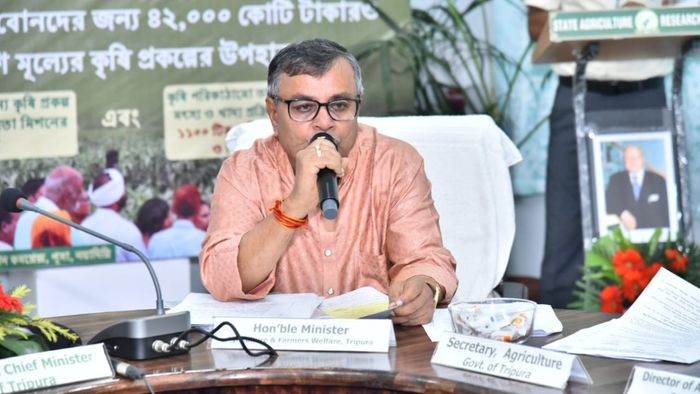Tripura aims for food grain self-sufficiency with urban farming push: Minister
Tripura is taking significant steps to become self-sufficient in food grain production, with districts like Dhalai and Khowai expected to achieve self-reliance soon, Agriculture and Farmers’ Welfare Minister Ratan Lal Nath said on October 11.

- Oct 11, 2025,
- Updated Oct 11, 2025, 6:38 PM IST
Tripura is taking significant steps to become self-sufficient in food grain production, with districts like Dhalai and Khowai expected to achieve self-reliance soon, Agriculture and Farmers’ Welfare Minister Ratan Lal Nath said on October 11.
The state government is intensifying efforts to boost agricultural productivity and promote urban farming in city areas.
Minister Nath made the announcement during a state-level program at the State Agriculture Research Station, AD Nagar, where three major agricultural schemes—PM Dhan Dhanya Krishi Yojana, National Mission on Pulses, and National Mission on Natural Farming—were launched in the presence of Chief Minister Prof. (Dr.) Manik Saha. These schemes, unveiled recently by Prime Minister Narendra Modi and Union Agriculture Minister Shivraj Singh Chouhan, aim to strengthen food grain production and sustainable farming practices across the state.
“The PM Dhan Dhanya Krishi Yojana targets 100 districts nationwide with low food grain output, including North Tripura. Through this, we aim to expand cultivation areas, enhance food grain production, and strengthen agricultural capacity in districts like Khowai and Dhalai,” Nath said. He added that while South Tripura, Sepahijala, and Gomati districts are already self-sufficient, others are steadily catching up.
Also Read: Tripura plans new adventure and eco-tourism park to boost tourism, create jobs
Tripura has achieved notable success in rice cultivation, ranking sixth in the country with an average yield of 3,299 kg per hectare, surpassing the national average of 2,882 kg per hectare. In pulses production, the state records 856 kg per hectare, slightly below the national average of 881 kg per hectare. Sepahijala leads in agricultural credit distribution, followed by South and West Tripura, with North Tripura lagging.
The minister emphasized a renewed focus on pulse cultivation, organic farming, and reducing dependency on imports. “Earlier, we relied on imports for potatoes, but within three years, Tripura will become self-sufficient in potato and onion production. Our farmers are hardworking and resilient, and with favorable rainfall, Dhalai and Khowai will soon achieve self-sufficiency in food grains,” Nath said.
The government is encouraging farmers to adopt organic and sustainable practices, ensuring steady production growth despite limited cultivable land, while leveraging the state’s abundant rainfall to overcome challenges such as insect infestations.